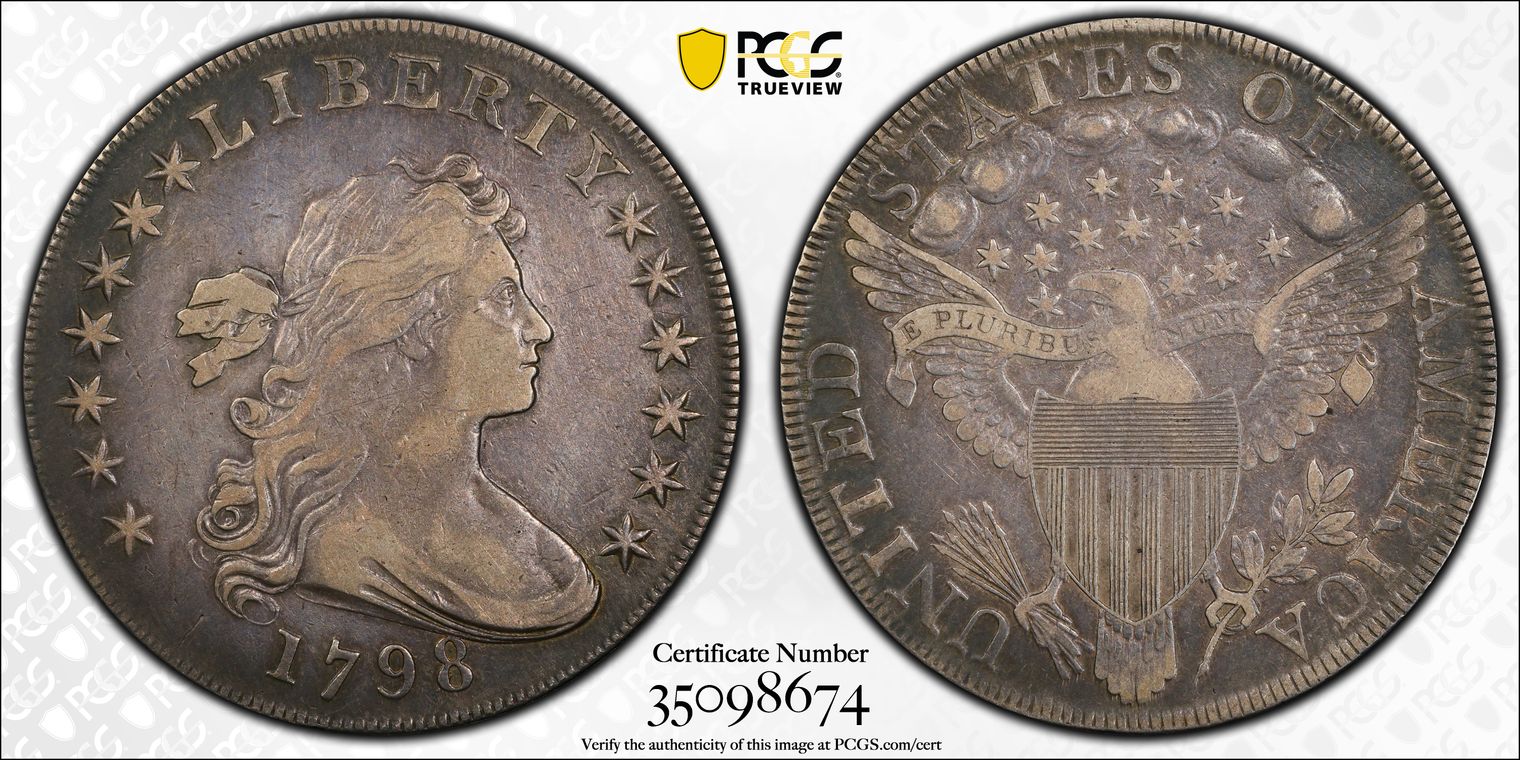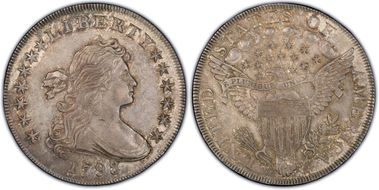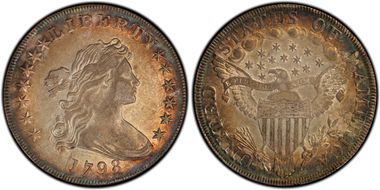1798 $1 BB-105 VF30 认证号35098674, PCGS号40022
专家评论
Q. David Bowers
The following narrative, with minor editing, is from my "Silver Dollars & Trade Dollars of the United States: A Complete Encyclopedia" (Wolfeboro, NH: Bowers and Merena Galleries, Inc., 1993). Note: the Notable Specimens list should be used with caution - it has been updated in my 2013 edition of "The Encyclopedia of United States Silver Dollars 1794-1804."B-23, H-23
OBVERSE 7: See description under 1798 BB-104. Usually lightly struck at the centers.
Obverse die used to strike 1798 BB-104 (early state) and BB-105 (early and late states).
REVERSE H: Several die flaws, one between ST, another between TE, another (It right of E in STATES. Curved die flaw above third upper right star on reverse. 5 small berries, the two above closest together. Leaf point is under left foot of I in AMERICA. Star distant from eagle's beak. Arc star pattern; star ray points to center of B in PLURIBUS. 13 arrows.
Reverse die used to strike 1798 BB-105 (late state) and BB-106 (early state).
DIE STATES:
Die State I: With reverse die in early state as used for BB-106. May not exist.
Die State II: Reverse die ever so slightly relapped in comparison to BB-106; now some details of cloud 3 are gone. Additional die flaws between ST, TE and the right side of the E in STATES. The usual state seen.
Die State III: Bolender-23a. As above, but obverse die now relapped, with highest wave of hair mostly gone, both bottom curls with parts missing, and stars 1 and two appearing spidery. About 20% to 30% of specimens of BB-105 are of this die state. Examples of Die State III include New Netherlands 48th Sale: 624, described as MS-60.
COLLECTING NOTES: 1798 BB-105 shares honors with BB-125 as one of the two most common varieties of the year and, indeed, one of the most common early dollars of any date. An estimated 850 to 1,500 are believed to exist. Most are in lower grades. In AU and Mint State grades it is rare.
NOTABLE SPECIMENS:
Fairbanks Specimen. MS-63. Stack's, Fairbanks Collection (Ben Koenig), 1960: 548. "A superb Uncirculated specimen, full mint lustre. A trifle weak in the center.". Lester Merkin, A. J. Ostheimer, 3rd Collection, 1968: 264. "Pale golden toned Uncirculated. Struck sharply except in centers, surfaces splendid though with a few hardly visible bagmarks on hair, not disturbing the color. Planchet lightly streaked as made."
Brand Specimen. MS-60. Virgil M. Brand (presumed pedigree). Burdette G. Johnson .• New Netherlands 48th Sale, T.James Clarke Collection, 1956: 624. "Strictly Uncirculated, but not quite in the 'gem' class as claimed by Mr. Clarke. With delicate iridescent toning; microscopic abrasion nicks, almost entirely upon the obverse." Pedigreed to Virgil M. Brand through B.G. Johnson, who with Henry Chapman was one of two early appraisers of the Brand estate.
Hollinbeck-Kagin Specimen. MS-60. June 1970: 614. "Uncirculated, sharp strike, perfectly centered, lovely bluish golden patina!"
Terrell Specimen. MS-60. Bowers and Ruddy Galleries, Terrell Collection, 1973: 901.. Bowers and Ruddy Galleries, Austin Collection, 1974:19. "Uncirculated. With light mottled iridescent toning. Some minor marks visible with a glass."
Harte Specimen. MS-60. Bowers and Ruddy Galleries, Roy Harte Collection, 1977: 2785. "Brilliant Uncirculated, lightly toned. Exceptionally well struck, particularly on the 13 stars on the obverse."
Long Beach Sale Specimen. MS-60. Heritage, 1988: 963. "Minor edge defect, as struck, just enters the second T in STATES. Lustrous surfaces blanketed in a pleasing layer of mottled gray, rose and pastel green. A bold striking which shows softness only in the very centers."
Chalkley Specimen. MS-60. Superior Galleries, Chalkley Collection, 1990: 2846. "Deep, charcoal gray toning through-out with hints of lustre about the devices. The surfaces are very clean and reveal only the faintest contact marks under close scrutiny with a glass. Well struck, with all devices, stars, curls and wing feathers bold."
Davis Specimen. AU-58. Stack's, Davis-Graves Games Davis) Collection, 1954: 1290. "Full mint lustre. Just a shade from Uncirculated, although struck weak in center."
DeCoppet Specimen. AU-55. James Kelly, Andre DeCoppet Collection, 1955. "Practically Uncirculated, Very slight adjustment marks."
Ron Guth
Bruce Morelan, in an interview with PCGS in 2016, spoke about his Finest Known PCGS MS65 example: “The 1798 Large Eagle, or Heraldic Eagle, is from the Stellar Collection. That coin is probably as responsible for me building this set as any other coin, including the 1794. It's a full luster coin, beautiful, uncirculated specimen, and I didn't know it at the time, but it's a rather rare coin in that condition. And so I didn't appreciate the opportunity as much when I actually acquired it as I do now, knowing how hard it would have been to acquire that date.”
PCGS #
40022
设计师
Robert Scot
边缘
Lettered: HUNDRED CENTS ONE DOLLAR OR UNIT
直径
40.00 毫米
重量
27.00 克
铸币数量
287536
金属成分
90% Silver, 10% Copper
更高评级数量
20
评级较低的钱币数量
13
地区
The United States of America
价格指南
PCGS 数量报告
拍卖 - PCGS 评级的
拍卖 - NGC 评级的























